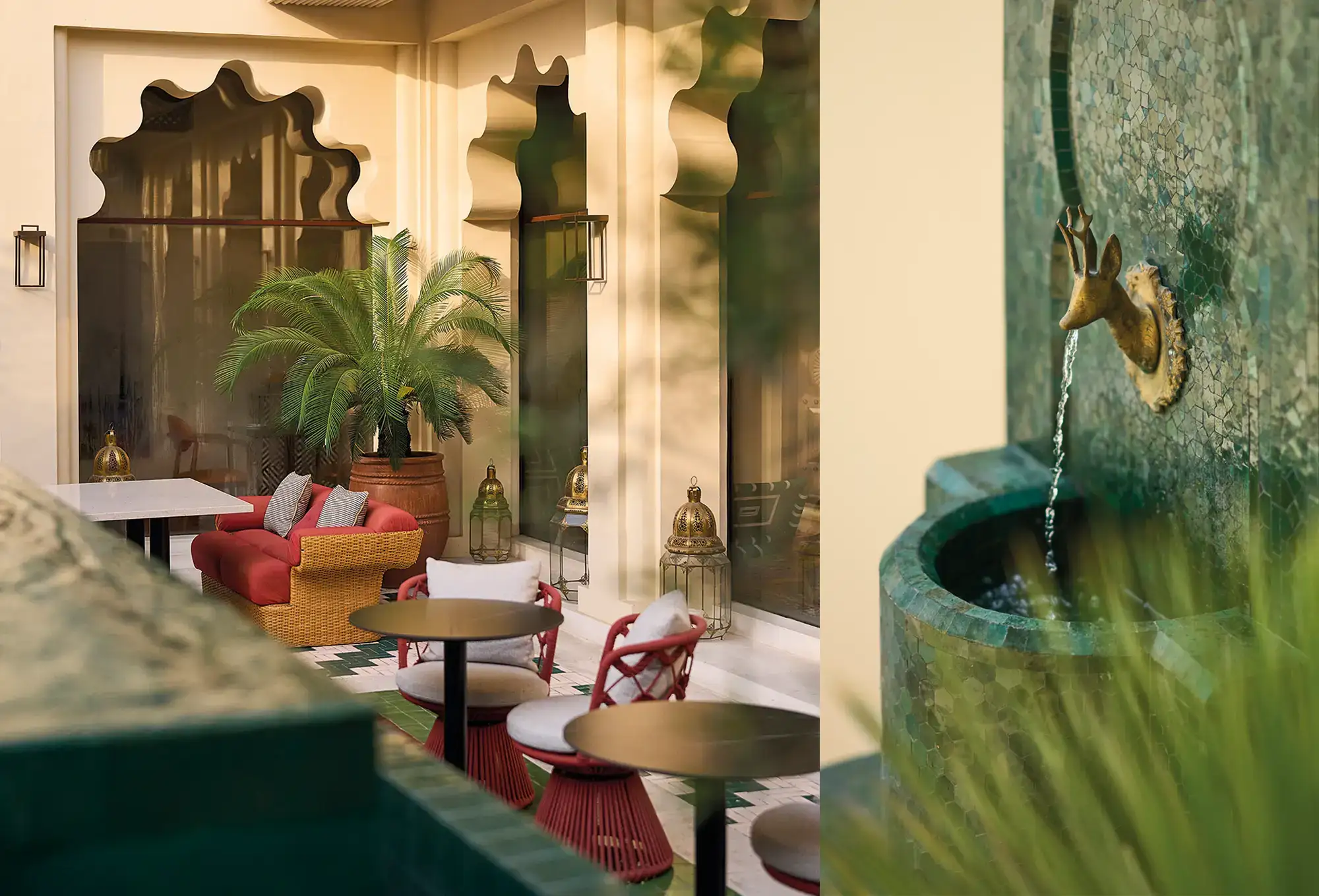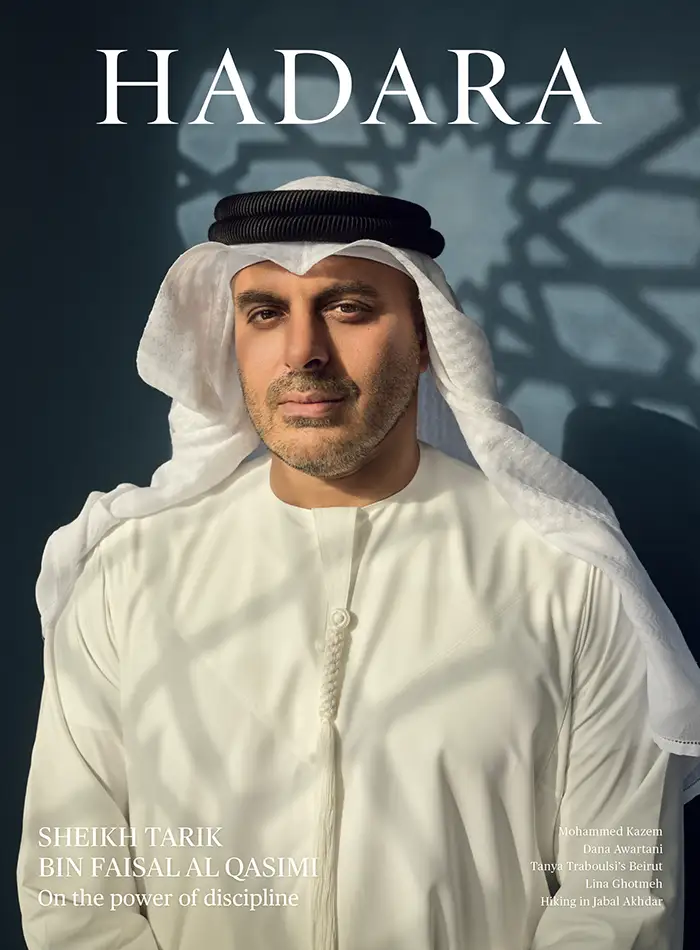Narratives of the past
The exquisite Bait Elowal is a bridge between generations and cultures.
By Nicola Chilton
Photos by Sebastian Böttcher
Step into Sharjah’s new—but old—Bait Elowal, and time seems to move at a different pace. A passion project of Her Highness Sheikha Bodour Al Qasimi, Founder of Bait Elowal, born out of a love of travel, cultural curiosity, and exquisite taste, it’s a place that resists description. Part restaurant, part beautifully curated boutique, Bait Elowal occupies a century-old house in Sharjah’s historical heart. There’s a rooftop for tea and relaxation, offering views of the wooden dhows that line Sharjah Creek. There are spaces for workshops and yoga, a private dining room with peacock-blue walls, and a welcome sense of slowness and stillness throughout.
The bait itself was once home to the Al Mazrou family, and has stood for a century near the old city wall and Sharjah Creek. Originally accessible by boat in the years prior to the construction of the corniche, the house has borne witness to the evolution of the city around it. Her Highness describes her first encounter with the building as “love at first sight”.
“There was a sense that the house had witnessed lives, conversations and moments that still lingered in the air,” she says. “I didn’t immediately know what it would become, but I knew it held something truly worth preserving, a rare embodiment of authentic heritage. That quiet pull stayed with me and eventually grew into the vision for Bait Elowal.”
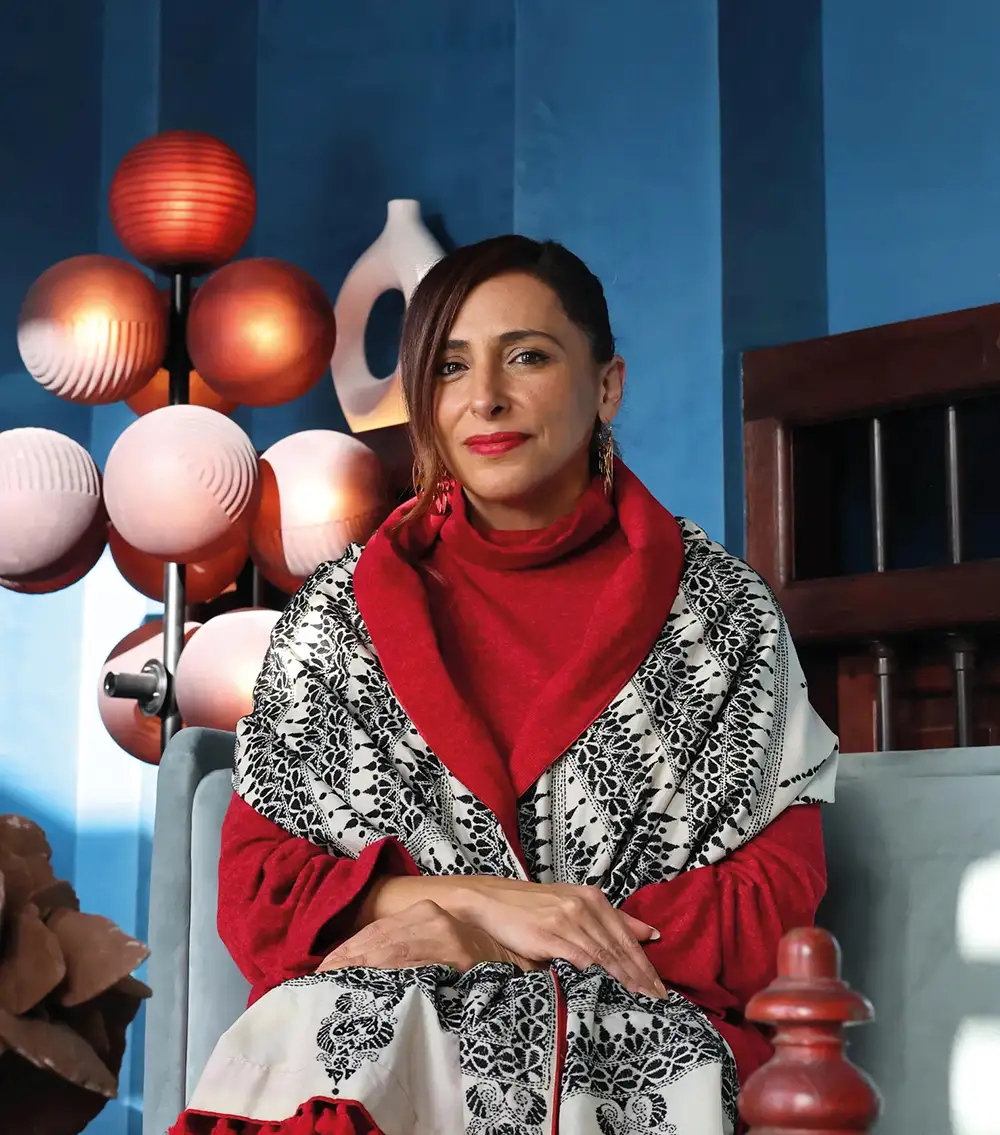
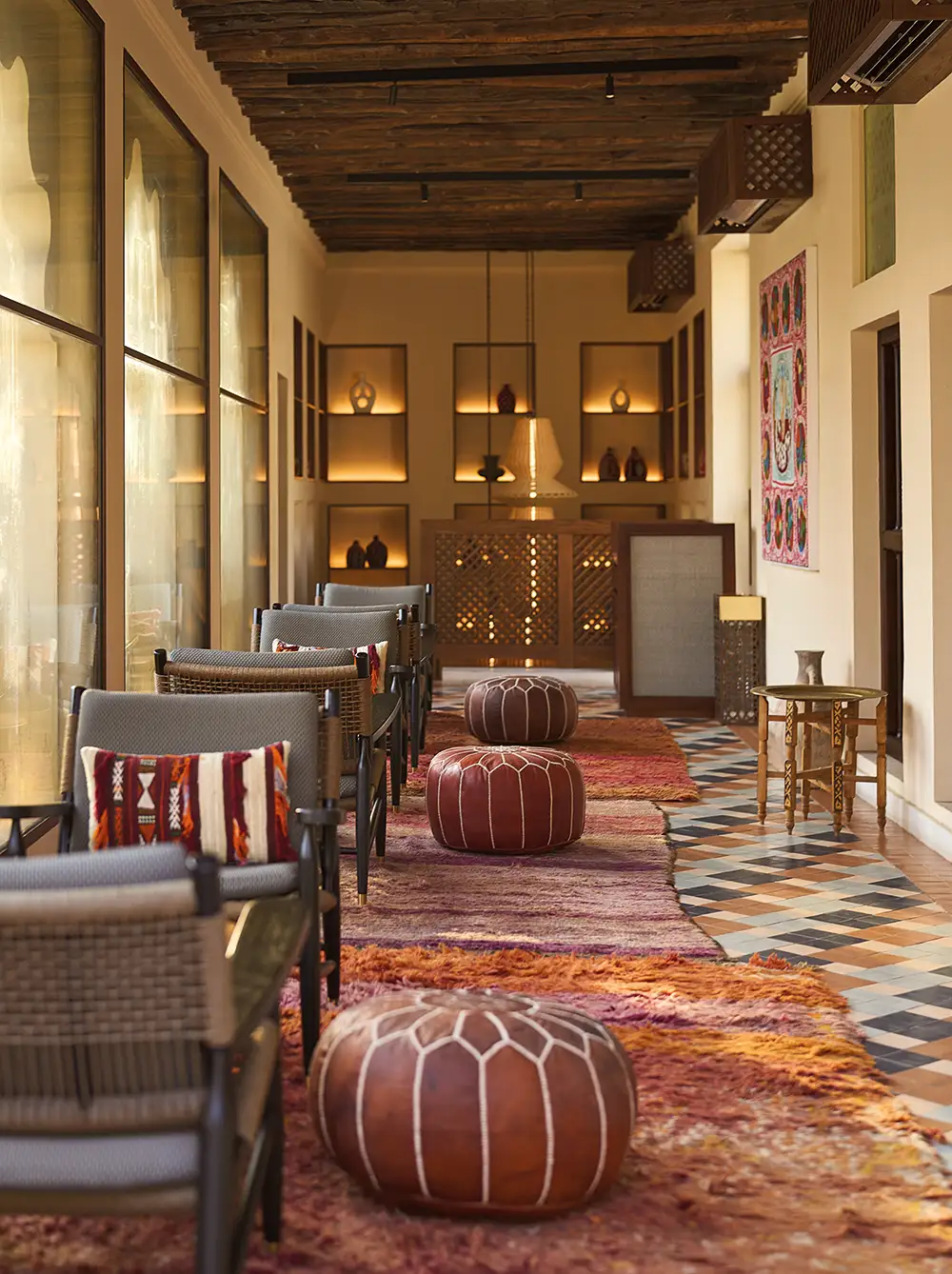
For Her Highness Sheikha Bodour Al Qasimi, Bait Elowal is a passion project. The objets d’art, decorative items, carpets and furniture pieces are the result of many years of Her Highness’s own travels. Combined, they reflect the traveller’s sense of adventure.
Facing the creek on Al Mureijah Square, Bait Elowal is an example of local vernacular architecture with elements that embrace a sense of modernity, like the geometric designs on the ventilation windows and the wave-shaped arches that surround the courtyard. The spaces have been lovingly restored, with subtle enhancements made to improve lighting and air flow, but the house largely maintains its original form.
“Our intention was never to transform a space for convenience,” Her Highness says. “It was about honouring the spirit of what already existed. We consciously avoided modernisation that would erase its soul.” Instead, Her Highness meticulously preserved the home’s original layout, courtyard, and historical madbasa (a storeroom used for the production of date honey), ensuring the intrinsic character remained. “This home became a vital bridge between generations, a reminder that the narratives of the past can profoundly anchor and inspire how we live today,” she says.
The name Bait Elowal references Sharjah’s trading heritage and the travellers who journeyed near and far, collecting memories, stories, and souvenirs that they brought back home. This sense of adventure, of the peripatetic nature at the heart of every traveller, is everywhere in the house, in the collection of objets d’art, decorative items, carpets and furniture pieces that are the result of many years of Her Highness’s own travels.
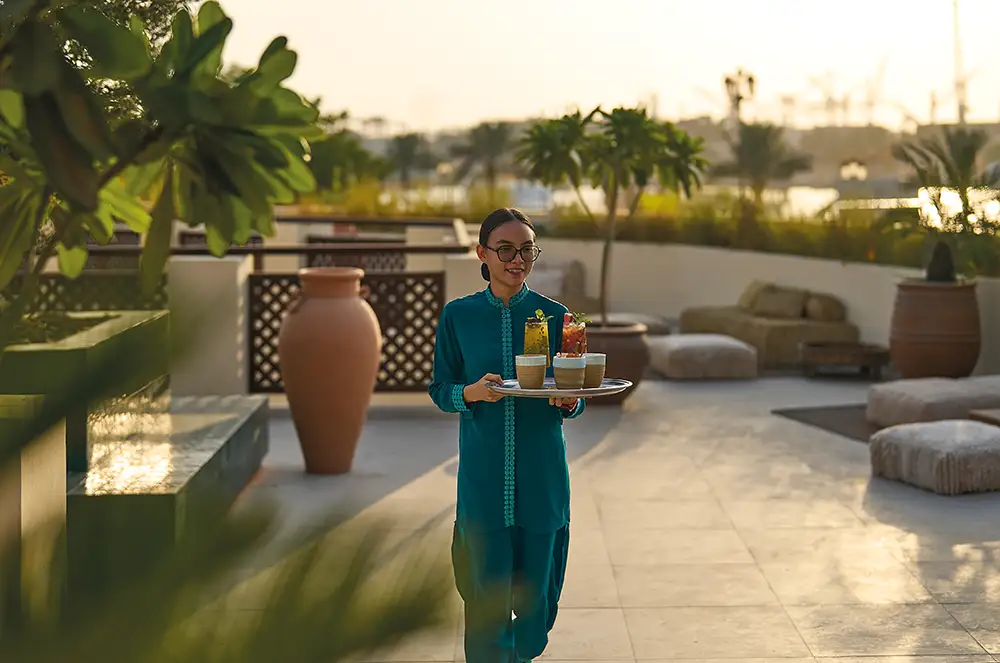
The rooftop is for tea and relaxation, complemented by views of the wooden dhows that line Sharjah Creek.
“Each item in Bait Elowal tells a distinct story and carries a palpable sense of place,” she explains. Moroccan rugs are woven using centuries-old techniques, zellij tiles are hand-cut and individually placed, slight variations in each rendering a unique beauty. Indian swings, discovered in the markets of Jaipur, add a playful element. “There was no strict formula, rather an innate instinct for what resonated as authentic and deeply meaningful,” Her Highness says. “The truly rewarding aspect was witnessing how these items, which might individually seem disparate, converged to create a unified harmony.”
Twin neem trees flank the entrance. Handsome, intricately carved wooden doors, now painted moss green, are original. Inside, the chirping of birds and the gentle gurgle of a fountain form a sonic backdrop to the courtyard, a space that is at once social and contemplative. Even when the sun is blazing on the street outside, the courtyard is cool and calming. It’s a place where it feels as natural to sip coffee and immerse yourself in a book as it does to strike up a conversation with your neighbour at the next table. Materials such as terrazzo and rattan, combined with a palette of ochre, cream and sage, form an earthy tapestry.
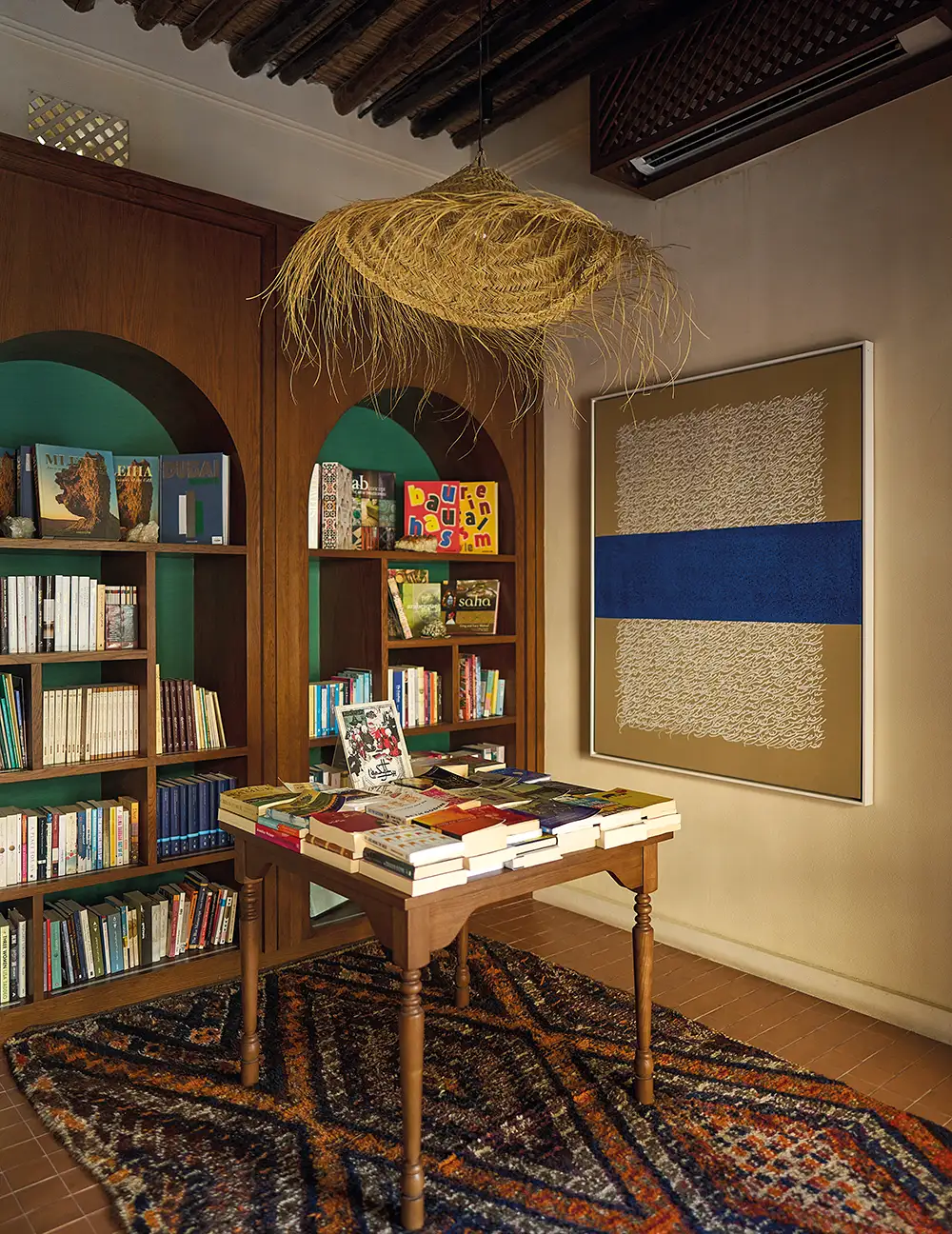
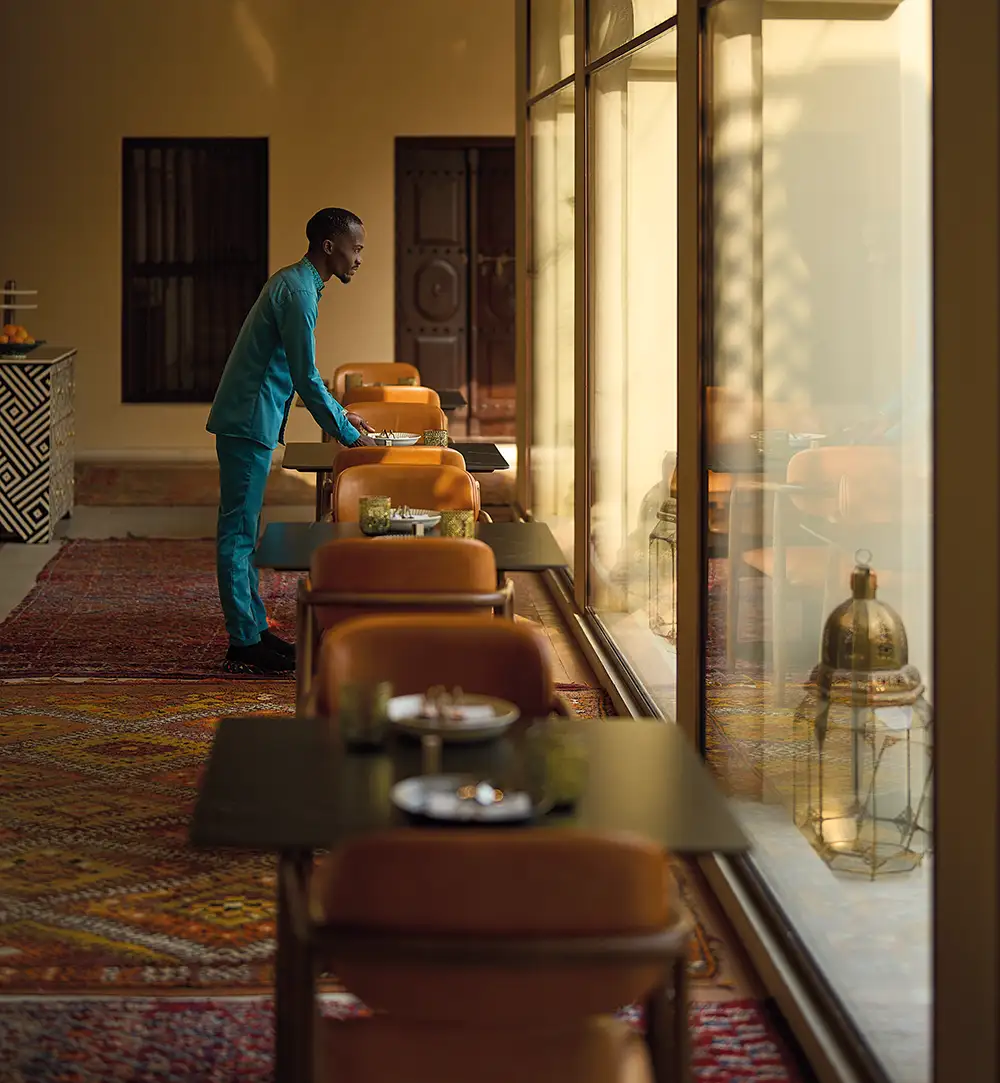
Al Kutubkhana, top, meaning “House of Books” is a curated bookstore offering a diverse selection of Arabic and English literature. Above, dining at Bait Elowal is itself a journey, inspired by the Silk Road.
Alongside the courtyard is the sprawling Soghat Elowal boutique, with one section dedicated to children’s clothing and cultural, educational toys, many made in the UAE. There’s a selection of Arabic and English books in Al Kutubkhana, spanning Moroccan decorative arts and the ancient treasures of Mleiha, novels ranging from Nikos Kazantzakis’s Zorba the Greek to Anthony Burgess’s A Clockwork Orange, and more than 80 works by His Highness Sheikh Dr. Sultan bin Mohamed Al Qasimi, Sharjah’s ruler.
Another space is filled with clothing and accessories, including garments embroidered by women in Palestine, silk scarves from Uzbekistan, and traditional Emirati embroidered dresses, known as mkhaweer. There are also teas from Moroccan photographer Hassan Hajjaj’s Jajjah range, and Tacapae olive oil from artist eL Seed’s family orchard in Tunisia.
Bait Elowal’s restaurant already draws a loyal crowd of Sharjah regulars with menus inspired by the Silk Road—not only with ingredients from lands touched by the route, but also its spirit of connection. “Those ancient trade routes were never solely about commerce,” Her Highness says. “They were vibrant conduits for shared ideas, cherished rituals, and diverse flavours that journeyed across cultures.”
Dining here is itself a voyage, with dishes ranging from Emirati balaleet and smoky tatouka with poached eggs at breakfast, to delicate Borani-e Esfenaj (Persian sauteed spinach), roasted duck with mulberries and preserved lemon, and saffron ferni rice custard with Madagascan vanilla and orange blossom throughout the day. It’s a menu that complements the ambience.
“My intent was never for Bait Elowal to feel merely designed,” Her Highness says. “I wanted it to feel genuinely discovered. Every element, whether grand or subtle, carries with it a distinct journey, and that is precisely the feeling I hope visitors depart with, a profound sense of stepping into a story that perpetually unfolds.”

